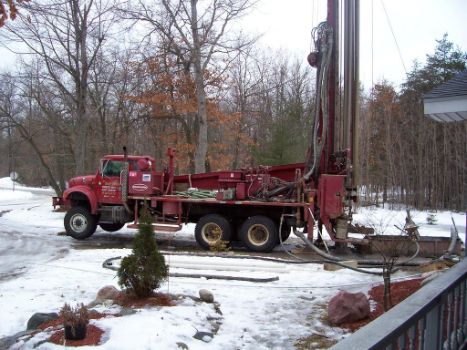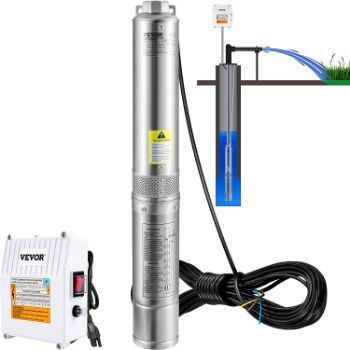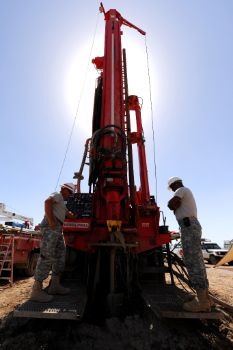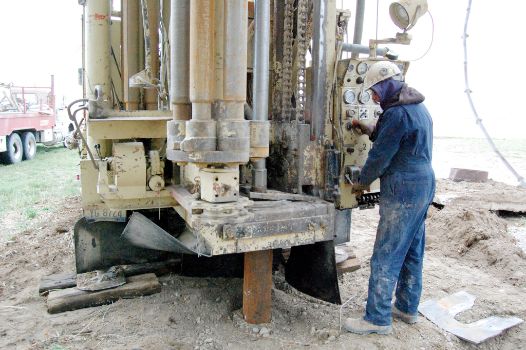When you decide to drill a well on your property, it is essential to know about the drilling cost. Please note that the drilling cost is almost the same across all the States. There may be little differences from one state to another.
Average costs of Drilling a Well – An Overview
The total average cost varies from $1,500 to $13,000. The national average cost for drilling a well at your property is around $5,500.
It depends upon the level of services you avail, the depth of drilling, materials used in the well casing, machinery used for drilling, pressure switch, type of storage tank, and other equipment you are installing with the system.
Let’s look at a detailed breakdown of every component. Please keep in mind that the costs mentioned in this article are just an estimated average of the data we have collected from various states.

Cost of Drilling
For drilling and digging of a well, the costs can range from $20 to $30 per foot and so on depending upon the type of services you avail. Digging cost is estimated to be $10-$15/foot. Digging is ideal for shallow depths and soft soils. For more hard surfaces, where deeper penetration is needed, the process of drilling is required. The estimated cost for different types of wells is highlighted below.
Residential Wells – Residential wells are the most inexpensive to drill. You can expect the cost to be in the range of $15 to $25/foot depending on the composition of the soil and the presence of rocks in it.
Agricultural Wells – For commercial pumps, the borehole is larger, and you need to go in deeper to get more pressure, this is why the costs are higher as compared to residential wells. Agricultural or irrigation wells per-foot drilling costs are around $35-$55/foot or higher in some cases.
Artesian Wells – When you use a water aquifer instead of a water pump, the cost comes out in the bracket of $30-$50/foot. Such a system takes advantage of rock layers underneath the soil, and the well releases the pressure causing the water to rise naturally.
Drilled Wells – Drilled wells are the most common in the country. Drilled well costs start around $5,000 and go up to $15,000. These wells are built using high-end machines such as rotary and auger bits. Drilled wells last for almost 50 years with fair usage.
Dug Wells – Dug wells or shallow wells are ideal in places with water near to earth’s surface. They can cost as low as $3,000. Most dug wells are constructed using hand tools or lightweight machines.
Driven Wells – Driven wells are constructed on sandy and soft soils. They are constructed using a steel pipe with a screen attached to its bottom. The pipe is pushed into the ground with the help of lightweight machines. A driven well costs around $4,500.
Re-drilling a Well – Some people may want to re-drill an already drilled well to get more water. The cost is around $30-$70 per foot with total costs ranging from $3000-$8000, depending on well depth and repairs required.
Costs of Well Components
The well components include well casing, water pump, pressure switch (along with the electrical wiring), pressure storage tank, and water treatment plant. Let’s look at the individual cost of each component.
Well Casing – It is used to protect your well from soil and sediment contamination. It is the casing on the sides of the well, and its cost is directly related to the depth of the well and the material you use. For soft soils, PVC is fine, for soils with rocks and gravel, steel casing is recommended. The casing will cost $600-$2400, and the labor price is around $200-$500.
PVC is the most commonly used well-casing material in the US. It costs $6-$10 per foot. It is corrosion-resistant and durable but may not be the right choice for deep wells. PVC has a certain weight-bearing capacity and cannot handle the weight and pressure of surrounding soil and rocks in deep wells.
Many people use steel pipes for deep wells. They are highly durable and much more resilient than PVC pipes. Steel pipes cost $30-$120 per foot. The only problem is steel isn’t corrosion-resistant.
Well Screen – The well screen is the mesh at the bottom of the well that allows water to pass through but stops sediment. The average cost of a well screen is $20-60 depending on well diameter and screen material.
Well Pump – Well pump is one of the main components of a well water system. It usually costs around $200-$2000 depending upon the power and quality of the well. The labor for installing a water pump is $50-$200.

Pressure Switch & Wiring – The cost for pressure switch and wiring is approximately $50-150, and the labor is $200-$500. The pressure switch is used to control the pressure setting on the pump.
Pressure Storage Tank – It is the most costly part of your well system and is used to store water. Expect to pay a hefty sum of $1000-$1500 along with labor charges of $200-$500.
Water Treatment Plants – Water treatment plants are also needed to ensure water purity. Though it is not a basic component of your well water system, keep in mind that you will have to install it to ensure that the water you are drinking is pure. The price varies depending upon the filtration capability and capacity. You can select the filter after getting the water tested. A water treatment system can cost between $500 to $8,000 or more, depending on the water quality in your area.
Recommended Well Water Filters: SpringWell Well Water Filters
SpringWell is one of the few brands specializing in well water filters. Its filters are designed keeping in mind the common contaminants in well water. The best part is that you can customize the water treatment system based on contaminants found in the water.
SpringWell offers various products, including
- Whole House Water Filtration System
- Salt-Free Water Softener System
- Well Water Filtration System
- Water Filter and Salt-Free Water Softener
- Well Water + Salt Based Softener Combo
- Well Water + Salt-Free Softener Combo
- Whole House Lead & Cyst Removal System
- Water Testing Kit
- Salt-Based Water Softener
- Water Filter and Salt-Based Water Softener
- Reverse Osmosis System
- UV Water Purification
- Spin Down Sediment Filter
- ULTRA Whole House Well Water Filter
- Calcite pH Neutralizer
- Chemical Injection System
- Tannin Removal System
Drilling Costs according to Casing Types
The following table will clear the idea of total drilling costs along with all the components and labor in your mind.
| Depth in Feet | 4-inch PVC Casing | 6-inch Steel Casing | 8-inch Steel Casing |
| 50 | $1,775 | $3,060 | $4,200 |
| 100 | $3,550 | $6,120 | $8,400 |
| 150 | $5,325 | $9,180 | $12,600 |
| 200 | $7,100 | $12,240 | $16,800 |
| 250 | $8,875 | $15,300 | $21,000 |
| 300 | $10,650 | $18,360 | $25,200 |
| 350 | $12,425 | $21,420 | $29,400 |
| 400 | $14,200 | $24,480 | $33,600 |
Please note that for your understanding, the above prices include full prices for a well system with different casings.

Price Variation Factors
Certain factors can impact the total costs associated with setting up a well. These factors are explained below to give you a better idea about the total cost you will have to bear
Depth of the Well – If you are digging a deep well, the price will increase compared to digging a shallow well. If you are lucky, you may find water around 30-50 feet below the surface. Shallow wells may be cheaper but are exposed to a high risk of contamination. You will have to install a high-quality water filtration system along with a shallow well. State authorities regulate the minimum depth of your well.
Soil Quality – The quality of soil can also influence the drilling cost. For soft soils without hard rocks, drilling cost is low. For hard soils with rocks, the price is higher. Drilling companies charge you more as they have to employ heavy machinery and more personnel to get the work done.
Well Permit – You need a permit to drill a well on your property. The national average is $300-$700 and varies from state to state.
Distance to House – If the well is located at a faraway distance, you will have to pay more for laying up water pipes. If you are drilling a new well, try to build it a feasible distance from your home as you can save up to $50-$100 for every foot closer to your home. Make sure you follow all the local laws when constructing your well.
Septic System – A septic system is used to dispose of wastewater. Most homes with private wells have a septic tank installed. Your well contractor will guide you about its installation and setback distance from water well. The national average cost for installing a septic system is around $7,500.
Water Testing Cost – For private well owners, getting the water tested annually is important. Home testing costs $20-200 and lab charges are $100-600. We recommend SpringWell’s testing kit for reliable and accurate results.
Well Drilling Costs by States
| State | Average Cost/Foot |
| Alabama | $28 – $59 |
| Alaska | $33 – $75 |
| Arizona | $26 – $58 |
| Arkansas | $27 – $57 |
| California | $30 – $65 |
| Colorado | $28 – $62 |
| Connecticut | $30 – $66 |
| Delaware | $29 – $63 |
| District of Columbia | $31 – $69 |
| Florida | $26 – $58 |
| Georgia | $28 – $59 |
| Hawaii | $33 – $73 |
| Idaho | $25 – $55 |
| Illinois | $28 – $63 |
| Indiana | $27 – $59 |
| Iowa | $27 – $59 |
| Kansas | $28 – $61 |
| Kentucky | $27 – $59 |
| Louisiana | $27 – $61 |
| Maine | $27 – $58 |
| Maryland | $29 – $62 |
| Massachusetts | $31 – $69 |
| Michigan | $28 – $62 |
| Minnesota | $28 – $61 |
| Mississippi | $26 – $58 |
| Missouri | $27 – $59 |
| Montana | $27 – $59 |
| Nebraska | $26 – $56 |
| Nevada | $28 – $62 |
| New Hampshire | $28 – $61 |
| New Jersey | $30 – $67 |
| New Mexico | $26 – $56 |
| New York | $30 – $65 |
| North Carolina | $27 – $59 |
| North Dakota | $29 – $64 |
| Ohio | $28 – $61 |
| Oklahoma | $27 – $58 |
| Oregon | $27 – $59 |
| Pennsylvania | $28 – $61 |
| Rhode Island | $29 – $64 |
| South Carolina | $28 – $61 |
| South Dakota | $26 – $58 |
| Tennessee | $27 – $60 |
| Texas | $28 – $62 |
| Utah | $27 – $59 |
| Vermont | $27 – $58 |
| Virginia | $27 – $59 |
| Washington | $28 – $61 |
| West Virginia | $27 – $58 |
| Wisconsin | $28 – $61 |
| Wyoming | $28 – $61 |

Frequently Asked Questions
How can I save money while drilling a well?
- Here are a few tips to help you save money while drilling a well at your property.
- Get estimates from 3-5 drilling companies. Choose the one that offers the best value for money.
- Plan well drilling during the off-season to get discounted rates.
- Dig a shallow well if there is huge water potential in your area. Please note that a shallow well may dry faster than a deep one. So, choose wisely.
- Maintain your well regularly so you don’t have to pay hefty repair costs.
How long does it take to drill a well?
It depends on well depth, terrain, soil nature, and accessibility. Overall, it takes 2-4 days to dig a deep well. However, it takes a few more days to set up electric components, test the water, shock chlorinate it, and then test it again. All these things make the drilling process a week-long task.
Can I drill a well myself?
Some states allow individuals to do a DIY well drilling on their properties. If you plan to carry out the drilling yourself, you need to check the local laws before doing it. If permitted, you will need to rent out the drilling machinery and arrange all the well equipment. Drilling wells is not an easy task; hence you must look for qualified well contractors.
How to choose the best well driller?
Before choosing a well contractor, look for state licenses. Never hire a contractor without a drilling license. Make sure you ask for references and previous work history. It is best to crosscheck with the well owners and ask them about their working experience with a particular contractor.
Which is better; city water or well water?
Both have some advantages and disadvantages. If you don’t want to pay monthly bills, then well water is your only option. Well water brings along water management tasks such as water quality, purification, maintenance of well and well equipment. City water users don’t have to worry about such things.
What are some benefits of having a water well on your property?
- Better quality water (healthier and tastier)
- Water independence
- No monthly bills (however, well maintenance is your responsibility)
- Sustainability
- Increased property value
What is the average depth of a water well?
The average depth of a residential water well is 100-800 feet. The depth varies on how far you find water and how deep you want to drill a well.
What is the cost of building a 200 ft. well?
It costs around $7,100 for a 4-inch PVC pipe casing, $12,240 for a 6-inch steel casing, and $16,800 for an 8-inch steel casing. These are the total average prices and include everything.
How much is the cost to build a 300 ft. well?
The total cost for constructing a 300 ft. well is $10,650 for 4-inch PVC casing, $18,360, and $25,200 for 6 and 8-inch steel casing, respectively.
What is the cost of building a 400 ft. well?
The complete costs for building a 400 ft. well are as follows.
- $14,200 for a 4-inch PVC casing
- $24,480 for a 6-inch steel casing
- $33,600 for an 8-inch steel casing

Wow, I never knew that residential well-drilling services are a lot cheaper than other ones. My wife and I live in an area where water outages are very prominent, and we want to be able to solve that by having a water well outside our house. That being said, we’ll talk to reputable contractors who can build us one. After that, we’re going to avail for a water well system quality testing services to ensure that the water is safe to use.